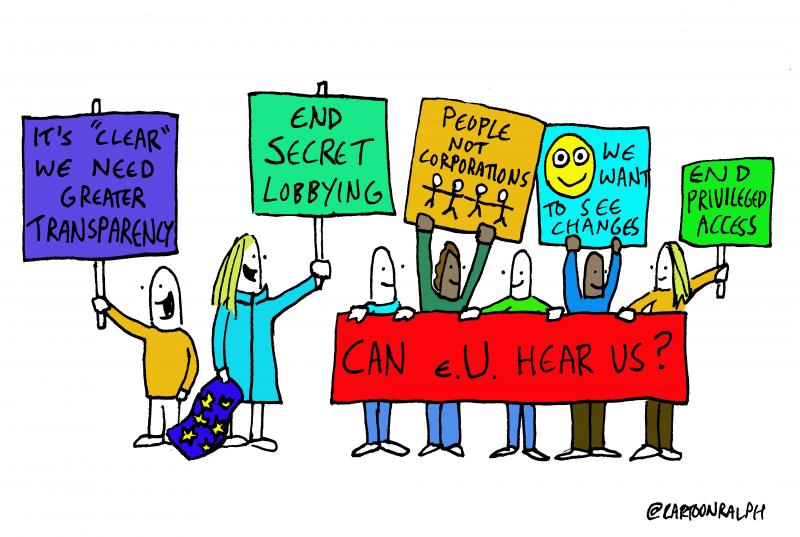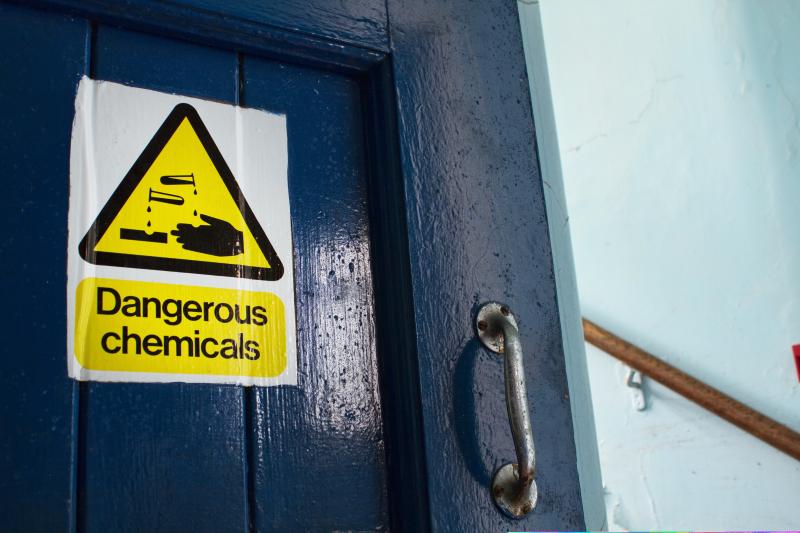
Chemical industry cheerleader: how DG Grow puts industry above public interest regulation
A roadmap for how the EU is to regulate toxic chemicals has been leaked, and the document reveals in stark detail the role DG Grow is playing in mirroring chemical industry lobbying points. DG Grow's sidelining of the public interest is a pattern, from its input on questions of affordable medicines to the Dieselgate scandal. It's time for root and branch reform in the European Commission to stop the corporate capture of DG Grow.
Today’s leaked draft Chemicals Strategy for Sustainability shows DG Grow (the European Commission’s Directorate-General for Internal Market, Industry, Entrepreneurship, and SMEs) working to protect the interests of the chemical industry at the expense of health and environmental standards. It is time to end the corporate capture of DG Grow.
The Chemicals Strategy for Sustainability (CSS) is part of the European Commission's Green Deal. Its stated aim is to “help to protect citizens and the environment better against hazardous chemicals and encourage innovation for the development of safe and sustainable alternatives” and it will review how the EU regulates chemicals.
The leaked CSS reveals an original DG Environment draft with many positive aspects. For example it proposes to speed up action to ban the most toxic chemicals, including endocrine disruptors, and to introduce a "Toxic-Free Hierarchy” to guide decision-making so as to avoid, minimise, and control damaging chemicals. DG Environment has hailed the forthcoming strategy as a "game changer" and the most significant development on EU chemicals policy since the REACH regulation 15 years ago.
DG Grow officials demand that at least parts of the draft “undergo a significant overhaul”
However, DG Grow’s comments on the draft seek to gut many of the progressive elements, minimise the health and environmental risks of chemicals, and parrot the demands and positions of the chemical industry (including CEFIC, the European Chemical Industry Council). In particular DG Grow officials demand that at least parts of the draft “undergo a significant overhaul”. They reflect the industry concern that the DG Environment draft as it stands would disrupt their sales of toxic chemicals, and the document provides clear evidence of DG Grow championing the views of industry over the public interest. In a mass of comments, deletions, and additions DG Grow officials want the CSS to be seen in the frame of “industrial competiveness [sic]” (ie. profits over precaution) and argue for an approach based on the flawed 'Better Regulation' concept, a corporate-friendly deregulatory drive.
The chemical industry lobby
The chemical industry is among the world’s biggest polluters and carbon users. It is also one Brussels’ most powerful lobbies. Major corporations such as Bayer (which owns glyphosate manufacturer Monsanto), BASF, and Dow all appear in the top 15 companies with the biggest annual EU lobby spend, declaring around €10 million between them. However there are also many other companies and trade associations which seek to influence either EU chemicals policy or the fate of their products in the regulatory system. But the dominant chemical lobby is surely CEFIC, the European Chemical Industry Council. With an annual declared lobby spend of €10.5 million, more than any other lobby group, together with 20 European Parliamentary access passes, the equivalent of 42 full-time lobbyists, and 99 meetings with the high levels of the Commission since November 2014, CEFIC is plausibly seen as Brussels’ biggest lobbyist. Additionally it appears to play a major advisory role to the Commission, sitting on or observing up to 30 different Commission expert groups. In May 2020, CEFIC put out a press release to announce its membership of a European Parliamentary intergroup: ‘Sustainable, Long-Term Investments & Competitive European Industry’. But there is currently no transparency about this group, its members, or its funding (despite this being a requirement), and the intergroup is not mentioned in CEFIC’s lobby register declaration. Additionally, CEFIC pays lobby consultancy Fleishman-Hillard over €800,000 a year for its lobbying services. As just one example of its work, Fleishman-Hillard working on behalf of CEFIC and its members lobbied decision-makers to oppose the regulation of titanium dioxide, during the recent battle. The chemical is a “suspected carcinogen” commonly found in paint and sunscreen.
This points to a much wider problem in DG Grow. The Commission and its DGs should act as a regulator but, especially when DG Grow is in the picture, it acts more like a cheerleader for industry. A look at the declared lobby meetings held by the DG Grow commissioners (previously Elżbieta Bieńkowska and now Thierry Breton) and their cabinets shows that business interests are granted eight times the lobby access given to NGOs and trade unions. And there are many recent examples when DG Grow has chosen to sacrifice health, social, or environmental concerns on the altars of ‘innovation’, ‘competitiveness’, and corporate profits. There are also cases with parallels to the CSS where DG Grow has tried to marginalise DG Environment or other DGs, or where DG Grow’s proposals mirror the demands of industry. We outline a few such cases below.
Car industry: Dieselgate
The 2015 Dieselgate scandal exposed how car companies such as Volkswagen were cheating on their emissions tests. But Dieselgate also revealed how the car industry received a sympathetic and lenient hearing from regulators around the world, including from officials in DG Grow.
An out-of-hours lobby meeting between DG Grow and a car industry lobby group guided the latter’s lobbying strategy
Under the auspices of its predecessor (DG Enterprise), officials had numerous meetings with the car industry over a long period and helped manufacturers delay stricter enforcement of emissions rules, to the chagrin of DG Environment, and contrary to the obligation on car manufacturers to cut toxic nitrous oxide emissions. In just one example, a leaked document exposed how an out-of-hours lobby meeting between DG Grow and the car industry lobby group ACEA (European Automobile Manufacturers' Association) guided the latter’s lobbying strategy on a proposal to introduce new tests for diesel cars. In the end, industry won this EU lobby battle – with thanks to DG Grow – ensuring the new testing regime contained a massive loophole benefiting the car industry, while toxic air pollution continues to kill thousands of EU citizens every year.

Gig economy: Services Notification Directive
In recent years digital platforms such as AirBnB and Uber have massively expanded their EU lobbying activities, in order to preserve the low or non-existent regulation of the gig economy and defend their profits. DG Grow has been compliant in this, despite the disastrous impact that these platforms have had on social issues such as affordable local housing, or established and well-regulated transport networks.
DG Grow’s preparation of the proposed Services Notification Procedure was seriously biased and violated the Commission’s own rules.
To add insult to injury DG Grow has sought to give the Commission the right to approve or reject draft laws being developed by local, municipal, and regional authorities across Europe before they are voted on, regarding issues covering land-use planning, housing supply, energy supply, water supply, waste management, and other areas. In 2019 Commission documents revealed that DG Grow’s preparation of the proposed Services Notification Procedure was seriously biased and violated the Commission’s own rules. Municipalities, engineers, architects, and tax advisers all had deep concerns about the Procedure, because it could threaten local democracy and prevent progressive policies such as taking privatised services back into public hands, but they struggled to be heard by DG Grow. Meanwhile officials entertained an active correspondence, and held several closed-door strategy sessions, with three big lobby groups BusinessEurope, EuroCommerce, and EuroChambres who were fulsome supporters of the plans. A grass-roots campaign finally put the brakes on DG Grow’s power grab just before the 2019 EU Parliamentary elections, but city politicians across Europe are worried that a revised proposal could come back at any moment.
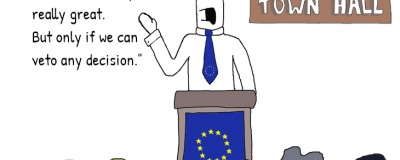
Big Pharma: Unaffordable medicines
DG Grow’s role in the health sector has caused real tension with DG Sante (Health and Food Safety) which is keen to preserve a focus on health outcomes. But DG Grow’s influence in more commercial directions has been profound. After the Council requested that the Commission critically review the EU’s pharmaceuticals system in order to tackle the growing problem of excessively high-priced medicines, DG Grow awarded the contract for the report to consultancy firm Copenhagen Economics. This consultancy regularly works for Big Pharma clients to produce materials and report findings that blatantly resonate with the industry’s economic interests and lobbying strategies, and which its clients then use directly in their lobbying of governments. Yet DG Grow deliberately chose this company to carry out what should have been a groundbreaking review that asked fundamental questions of the Big Pharma model. And the final outcome of the study? Predictably, Copenhagen Economics’ message was that everything is (more or less) fine so don’t change things too much. It echoed Big Pharma’s opposition to a reduction in the time-frame for industry's monopoly patents on new drugs, going against proposals by public health advocates to reduce prices for essential medicines.
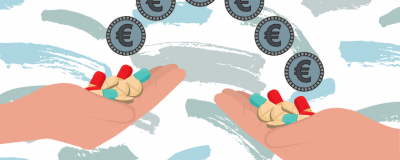
Across the Commission: European Green Deal
The Chemicals Strategy for Sustainability (CSS) will play a key role in the European Green Deal, the Von der Leyen Commission’s flagship policy which is supposed to tackle the environmental climate crises. If industry succeeds in watering down and manipulating the CSS to its own ends, what about the rest of the Green Deal being developed elsewhere in the Commission? Recent analysis by Corporate Europe Observatory shows a worrying pattern. In the first 100 days after the launch of the European Green Deal on 11 December 2019 there was a flurry of lobbying activity. Key Commissioners such as Von der Leyen and Frans Timmermans, and high-level Commission staff in charge of the Deal met 151 times with business interest representatives, and only 29 times with public interest representatives. Industry clearly has the European Green Deal in its sights, inside and outside of DG Grow.
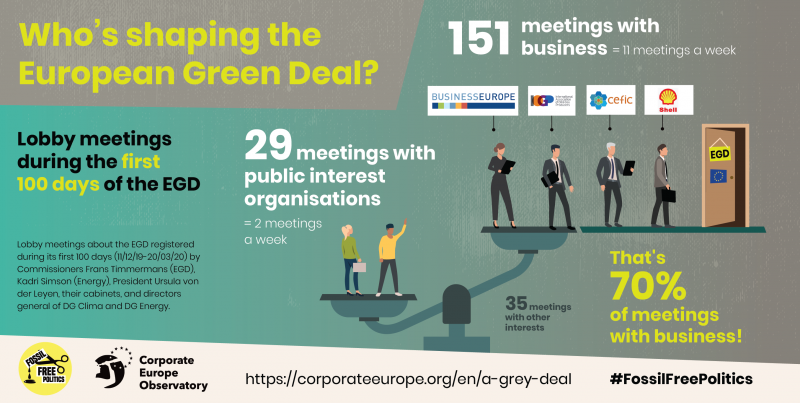
What needs to happen now?
The leaked CSS which shows DG Grow’s attempts to undermine its health and environmental objectives is yet more evidence that we urgently need new rules and a new culture when it comes to handling corporate lobbying.
-
We need concrete rules and action to protect and deliver public-interest decision-making and to counter the high risk of corporate capture which DGs such as Grow represent. The Commission has determined that “Members of the Commission should seek to ensure an appropriate balance and representativeness in the stakeholders they meet”. However there is no evidence that DG Grow, or any other Commission Department, has defined what this means or worked out how to achieve it. And this diktat for the high-levels of the Commission has certainly not been communicated to the heads of unit and policy officers working in the lower ranks of the Commission. This needs to change and DG Grow needs to stop seeing itself as a cheerleader for industry and to instead remember that its primary role is to regulate in the public interest.
-
We need much more proactive lobby transparency throughout the Commission, to include heads of unit, policy officers, and any other rank habitually targetted by lobbyists. It’s not enough that just commissioners, directors-general, and cabinet members proactively publish their lobby meetings as is currently the case, and the Commission has been complacent about this for far too long. We can see very clearly from this leaked strategy that lower level officials make significant inputs on both the broad direction and the detail of Commission policy proposals. We need to see which lobbyists such officials are meeting and all such encounters should be minuted.
-
The Commission needs to toughen up revolving door rules and the way they are implemented, including for incoming staff. It is remarkable that several of the DG Grow officials commenting on the draft CSS have backgrounds in the chemical industry, including one who rejoined DG Grow as recently as November 2019 after a spell with a chemical industry lobby group. The ongoing EU budget negotiations and subsequent review of the EU Staff Regulations will provide an opportunity for improved rules which should not be missed.
Conclusion
The Alliance for Lobbying Transparency and Ethics Regulation (ALTER-EU) recently wrote to Commission President Von der Leyen to raise the issue of corporate influence in the Commission and related issues, but the institution's response rejected the accusation and gave little hope that this will be a priority focus. But real issues are at stake.
There is a battle being waged within and without the Commission over the direction and detail of the Chemicals Strategy for Sustainability. On one side are civil society and MEPs who have called for an approach which prioritises health and the environment, and who can take some encouragement from DG Environment’s CSS. On the other side is industry, apparently backed by its allies in DG Grow, who are raising the alarm at a draft of the strategy which could seriously undermine the chemical industry’s sales of toxic chemicals.
If the CSS, the European Green Deal, and other Commission policies are to have credibility, the Commission needs to deliver urgent root and branch reform to prevent corporate capture of its policy-making.
